I have been asked to provide a comment on the current ongoing case of the GMC v Dr H Webberley. The Tribunal hearing is being held at the Medical Practitioners Tribunal Service (MPTS).
Firstly, this blog is an opinion on matters as they proceed, and I have no part in the case. I am merely viewing aspects from the outside, like many others. I am preparing this in a non-professional capacity, but I do have some experience at giving expert evidence at tribunal over many years.
I am getting updates from ‘live Tweets’ from the hearing provided from the Tribunal service and will see if I can get a press update as well. I am also thankful to @truesolicitor and others for their updates on this case.
In this case, and current tribunal hearing, Dr Webberley (Dr W) is accused of practising medicine outside the rules and regulations of the General Medical Council (GMC) during the period March -November 2016, A failure to hold a proper safeguarding policy, and (2018) a failure to be registered as a practice in Wales. But there is more to it than that. Dr Webberley is represented by her legal team headed by “IS”. The GMC is represented by “SJ”.
This update is from day 14.
Day 14
(Tuesday) [week 4] of the public hearing.
An early start today for the tribunal as it was up and running at 09:00
Today was a continuation of the cross-examination by IS of the evidence of the prosecution medical ‘expert’ witness Dr K.
The whole day was spent with this task. There was the odd intervention by SJ and the panel chair. It was a day about hearing information.
A lot of that information was detailed medical process and treatment protocols from the UK and around the world.
It is not for me to go into detail as I don’t have the knowledge or experience. However, I can summarise key aspects and explain how the hearing is playing out so far. These are important aspects as we move forward in the process.
There were no seismic revelations today, but a few surprises perhaps. Given, that Dr K is a medical expert although has not practised in the UK.
Remember, that Dr K, being an ‘expert’ witness has to be truthful and help guide the panel.
He has prepared his report which he considers is fair and will be based on guidance and key questions put to him by the prosecution team at the time of his briefing. Moreover, he will, it is assumed. Have been through this with the red team legal team and SJ will have had sight of it.
As such it shouldn’t be biased but will cover aspects in favour of the red team’s claims.
The role of IS, in this instance, is to find holes and gaps in the evidence and show that what is being given is wrong, misleading or agrees with the defence (Blue) team’s views.
Bear in mind, whilst this part of the hearing is mainly about IS questioning the Red teams’ witness’s, the reverse will be true in due course. Whilst IS will endeavour to lead the panel through DR W’s evidence, SJ will try and find the weaknesses and inconsistencies in it that show it ‘proves’ their case.
So, whilst this may seem a little one-sided for now, that could change. However, that all depends on what Dr W has to say and how that agrees or disagrees with the red teams witness evidence.
Whilst I have been identifying the weaknesses and inconsistencies found thus far by IS, SJ will get the same opportunity when he Cross examines Dr W. That could well be over a number of days.
You can be sure both QC’s will be taking notes and using the information thus far gained in an effort to bolster their own teams’ case.
Highlights of a long day.
Politics is a dirty word.
In early questions by IS, Dr K revealed a quite important aspect. Namely, that Politics WAS behind trans medical healthcare. This aspect and confirmation cropped up more than once. Well, that’s not a surprise, but openly admitting it is.
Bear in mind that the ‘politics’ of this case and the extent to which the GMC have bought this case, particularly with regard to the age and type of treatment of patients is about exactly that. That response does slightly undermine the argument from the GMC. Quite a large hole in their case really.
What about Guidelines?
Dr K “I agree that we don’t have to strictly adhere to the protocol, but you have to meet the criteria in your clinical practice.”
IS “ there were people back then (2009) providing CSH to people under the age of 16, a variety of clinicians in a variety of countries?”
Dr K “yes”
That is exactly what this case is about. Dr W being accused of providing ‘inappropriate care to under 16-year-olds in 2016. Yet, DR K has admitted, freely, that this was common practice around the world. That’s quite a big crack appearing.
Consistently inconsistent?
Through a series of questions, IS would ask Dr K about his report, the papers he has written himself and those prepared by others, including WPATH7. Each time DR K would respond as required (as far as IS is concerned) and undermine his own case. Essentially, he is agreeing to the views being put to him by IS that back up the case for Dr W.
However, as I have said before, it is the interpretation of the rules in place in the UK that may be a deciding factor here at panel decision time. What it definitely shows, is how out of touch with other countries on trans healthcare the UK/GMC and NHS really was.
I’m not making the judgement, but the panel can’t fail to have noticed this and, you can be sure IS will make this abundantly clear.
It is the patient that is important, isn’t it?
IS. “ If you allow the full biological puberty that is undesirable and can lead to significant emotional and social difficulties?”
Dr K “yes”
Well, no real surprise. However, again, that is the crux of what this case is about. Where (pre)pubescent adolescents were being denied NHS care from gatekeeping or having gone private, will get to this outcome. Many seek to avoid that and give themselves time to decide.
Dr K is readily accepting that this outcome of “undesirable puberty” is an issue and could be avoided. This is another key aspect of the GMC case against DR W, that has been undermined.
Remember that Dr K was one who felt that a patient being suicidal wasn’t enough, on its own, to treat them.
Dr K also agreed that “doing nothing” when treating trans patients wasn’t a “neutral option”.
This and after some awkward scuffling, he accepted that any form of treatment leave “a footprint” as he put it on a patient. This was surrounding the commencement of hormones and/or PBs and the stopping them. He accepted that most aspects are reversible, this ‘footprint’ would always be left. In this aspect, he was going against the NHS thinking that PBs are fully reversible.
That and it’s ONLY 09:37. This could be a long day!
A Team player?
Discussion and questions on Multi-disciplinary teams (MDT’s) came up a lot yesterday and today.
IS was trying to establish a reason and protocol for there use in trans patients in particular. He was trying to establish a definite benefit and if DR K accepted a consistent approach to this.
Dr K did get a bit tangled and eventually agreed to disagree with himself.
IS “ You have said many times about the importance of the MDT approach. Is there any evidence to support this? Any research?”
Dr K There is no clear-cut evidence that MDT works better, and I don’t think we’ll ever get that evidence. There’s not much research.”
This is a very important answer, as it yet again undermines one of the key arguments from the GMC that DR W acted outside the guidance. It would seem that there were other ways of doing things that were equally acceptable.
Age is important isn’t it?
This is a key aspect of this case, and it has been covered in questions before. Today it was about protocols elsewhere in the world and what Dr K thought about the appropriate age for commencement of treatment.
IS “Although Hospitals around the world are starting hormones earlier, some as young as 13, there is no evidence for that?”
Dr K “Correct. Not knowing is not a reason to not do it.” This despite his earlier claims that 16+ was usual because of.. politics!
Dr K also affirmed that age is not necessarily a deciding factor in the commencement of treatment and that stage of development of puberty is important, as this varies widely. This will be important later. It is evident that age and politics are entwined, and this is not necessarily for the best medical reasons, which is a fundamental aspect of this case.
Dr K also affirmed that there was “good feedback” on the treatment of patients on hormones at 13-16.
He even indicated that some studies are for children between 9 and 9.5 years.
Its important what you know about your subject as an expert, isn’t it?
Dr K stated and accepted that there were long waiting lists across Europe for young people awaiting trans healthcare.
He was asked by IS if he had heard of the Cass Review. He replied, simply, No.
This might seem a throwaway remark given where it was asked. But it’s not. It’s an important response, that shows Dr K isn’t up to speed on matters relating to healthcare in the country for which he is giving ‘expert’ evidence.
WPATH7
IS questioned Dr K at length on this document, it protocols and procedures.
What transpired was that Dr K accepted most of what it says and that this acceptance, reluctant at times, allows a flexible approach to trans healthcare rather than a rigid ‘gatekeeping’ one. Also, one with the ‘politics’ removed.
As such, an approach taken by the accused in this case perhaps.
Dr K repeatedly stated the WPATHWPATH World Professional Association for Transgender Health https://www.wpath.org guidelines were for adults and that practices shouldn’t necessarily be adopted for adolescents.
IS stated, and read from the document, that WPATH has no minimum age limit, but others suggest 16.
Dr K had to then admit, what he had said before was wrong.
A Rock and a Hard Place?
Interestingly, even Dr K admitted he doesn’t follow all the WPATH7 guidelines and take a ‘considered’ approach depending on the circumstances of the patient and his own experience.
IS questioned Dr K on whether a patient should get a second opinion at times.
He then stated that patients are indeed allowed to get a second opinion. However, there’s no point as there is nowhere to go to get that opinion. A bit of a gatekeepers closed shop, if such a thing exists.
The WPATH guidelines suggest patients are allowed a second opinion. This as we heard last week, is how patients were denied NHS care by seeking that second opinion from Dr W and she is now the accused in this case. That sounds a bit like a monopoly trying to close down the competition.
Stakeholders
No, not a family BBQ nor even grasping a post for support, but what, Well that was the question really.
On being questioned about ‘corrective’ procedure for a child born with “ambiguous genitalia”, as IS put it, he asked would surgery be “in the best interests of the child?”
The response was somewhat bizarre “ It’s complex, it’s not a given, you have to weigh in all the stakeholders. Not just the parents and not just the child.
This seemed to get metaphorical collective gasps.
Who are these stakeholders beyond the parents and the child? Where can they be found? Might they be politicians perhaps, funding authorities, insurers? Who knows?
GMC guidance 2016
Bear in mind we are here to hear that Dr W allegedly broke rules and guidelines of the GMC in 2016.
IS ran through those guidelines with Dr K (the expert witness for the prosecution).
IS (on waiting times) “..Drs can prescribe if patients are self medding, a harm reduction approach is recommended etc. This does not distinguish between adults and adolescents.”
Dr K “ Yes”.
IS asked Dr K if he had seen this document before. Dr K was very nervous at this point. He admitted he may have “skimmed it”, he might have received it but wasn’t really sure. IS stated, in a rather damming QC way, that the document was most likely in the bundle the GMC sent to Dr K, and the GMC could check this. In the light of what Dr K had now read (he was given a short break to read it) did it change his opinion in his report (as an expert)? IS stated, that Dr K had not referenced the document at all in his report.
Dr K seems adamant his views are unchanged, but really they are heavily embattled and questionable in many areas.
Rounding up for the day and reinforcement.
I have said before, the process of barrister questions is complex. There is a careful pathway, and each question is answered as expected. If not, it will be clarified.
Therefore, as DR K can’t attend for some weeks to complete his cross-examination (this is the aftermath of yesterdays debacle and late evidence) IS asks a clever closing question.
IS “Boys and girls enter puberty at different ages so it is not age but onset of puberty that should be considered. Also, the length of time that analogs are used for is another consideration?”
Dr K “ Yes, I have said that many times in the last few days.”
That response clarified a number of points IS has made over the cross-examination and about a flexible approach to trans healthcare and prescription of hormones and PBSs. That response affirms a non-rigid approach is acceptable. That gives IS huge ammunition in his examination of evidence and to counter the GMC claims on that very aspect.
It seems to be the NHS that is out of step with the WPATH and other ‘centres of excellence’
Perhaps a day of evolution rather than revelation, but a lot of valuable points for IS to take forward.
As I have said before, SJ will be aiming to do his best to try and undo some of this tangle and make it specific to Dr W, the NHS and UK. That will be his challenge.
What next?
There is no session tomorrow (Wednesday) and we are back for day 15 on Thursday. Dr A will be sworn in, and Dr K will return in late September.
To be continued…../
Nicola





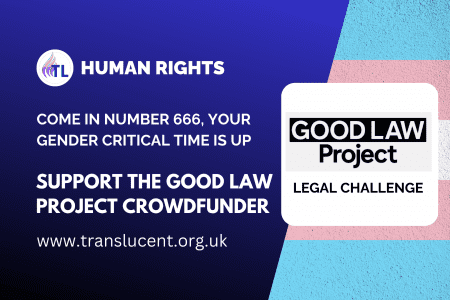
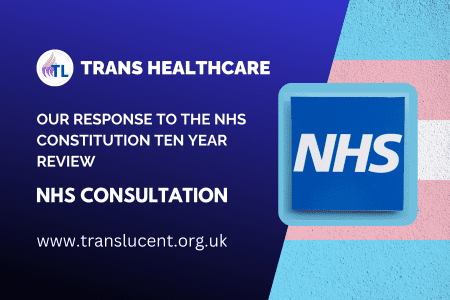
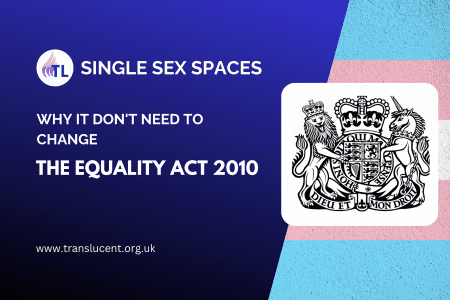

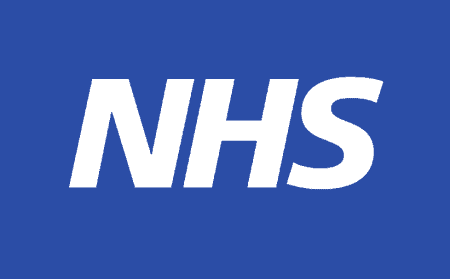
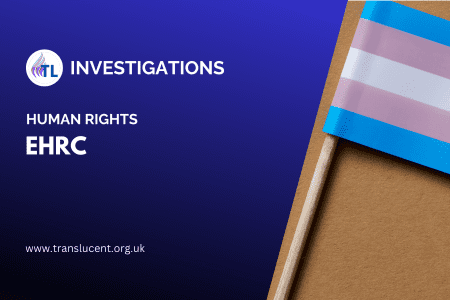
 To provide the best experiences, we use technologies like cookies to store and/or access device information. Consenting to these technologies will allow us to process data such as browsing behaviour or unique IDs on this site. Not consenting or withdrawing consent, may adversely affect certain features and functions.
To provide the best experiences, we use technologies like cookies to store and/or access device information. Consenting to these technologies will allow us to process data such as browsing behaviour or unique IDs on this site. Not consenting or withdrawing consent, may adversely affect certain features and functions.